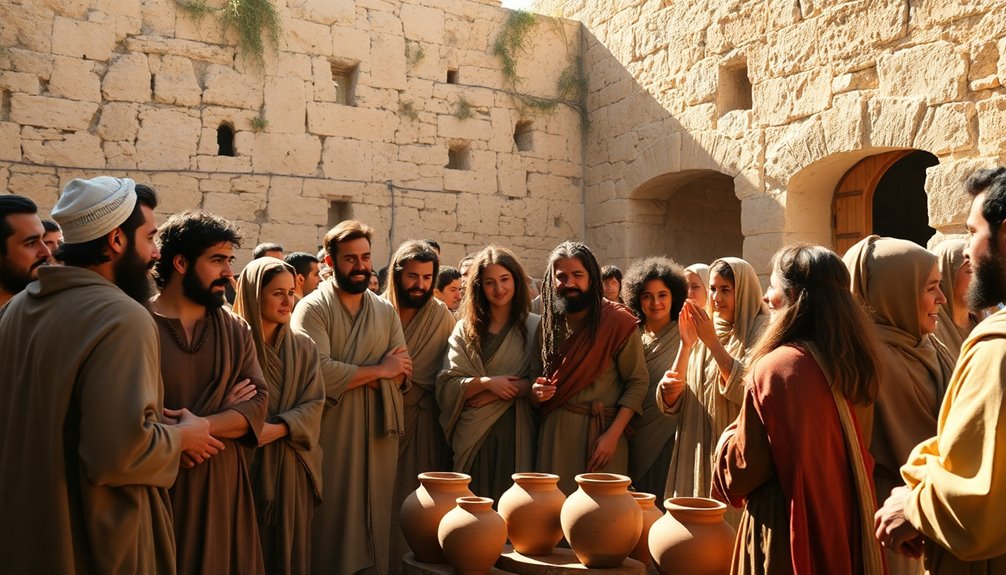Matthew 18:20 assures you that when two or three gather in Jesus' name, His presence is among you. This verse emphasizes the importance of community and collective faith, highlighting that shared prayer and unity foster a strong bond in spiritual matters. It's not just about casual gatherings; this scripture underscores accountability and support in addressing issues within the church. As you gather intentionally for decision-making or prayer, Christ's presence strengthens your purpose and efforts. There's much more to discover about how this principle applies to your faith journey and community dynamics.
Key Takeaways
- Matthew 18:20 emphasizes the significance of collective gatherings in Jesus' name, promising His presence among those united in faith.
- The verse highlights accountability and community, essential for addressing issues within the church and maintaining spiritual health.
- Contextually, it relates to church discipline, underscoring the need for witnesses in resolving conflicts and addressing sin.
- Early Christians practiced communal worship and decision-making, reflecting the importance of unity and shared responsibility in faith.
- Misinterpretation often reduces its meaning to small prayer groups, overlooking its focus on intentionality in accountability and reconciliation.
Introduction

When you gather with others in faith, you're tapping into a profound promise from Jesus found in Matthew 18:20. This verse reminds you that when two or three are gathered in His name, He's right there among you. It's not just about being together; it's about coming together with a shared purpose focused on Jesus and His teachings. You're agreeing to honor His authority and seeking His guidance in your discussions.
The significance of this gathering extends beyond mere fellowship. It emphasizes the importance of accountability within the church. When you confront wrongdoing or make collective decisions, you can find reassurance in knowing that Jesus supports your efforts. His presence validates your actions and intentions, providing divine backing as you navigate complex issues together.
Moreover, the historical context of this scripture highlights how early Christians incorporated this promise into their communal practices. Your gatherings today echo this rich tradition, reinforcing the ongoing relevance of coming together in faith.
Scriptural Context and Significance

To grasp the significance of Matthew 18:20, you need to consider its placement within the larger context of church discipline and accountability.
This verse not only reiterates the importance of having witnesses, as seen in Deuteronomy, but also emphasizes Jesus' promise of His presence during collective gatherings aimed at resolving issues.
Primary Bible References
Numerous Bible references contribute to the understanding of Matthew 18:20, enriching its significance within the Christian faith. This verse states, "For where two or three are gathered in my name, there am I among them," highlighting the power of communal gatherings.
It's essential to note that this promise of Jesus' presence is anchored in the context of church discipline. Before this verse, Jesus teaches His disciples about confronting sin, emphasizing the need for witnesses, as seen in Deuteronomy 19:15.
When two or three gather in His name, they're not just meeting; they're coming together to seek His will. The emphasis on agreeing on earth points to the importance of unity in prayer and action. Jesus promises His divine presence in such gatherings, reinforcing that you're never alone in your faith journey.
This collective dynamic is a foundation for accountability and support within the church community. Historically, Matthew 18:20 has shaped early Christian practices and continues to guide discussions about church unity.
Understanding these primary references helps you appreciate the profound impact of communal faith and the assurance of Jesus' presence among believers.
Secondary Bible References
Throughout Scripture, a rich tapestry of references highlights the significance of community and divine presence among believers. In Matthew 18:20, Jesus assures us that when two or three gather together in His name, He's present, reinforcing the biblical principle that we need two or three witnesses in matters of church discipline as outlined in Deuteronomy 19:15. This underscores the idea that confronting sin within the community carries spiritual weight and divine backing.
Acts 2:1-4 further illustrates how unity among believers in prayer can lead to powerful experiences, such as the outpouring of the Holy Spirit. When you agree about anything in this collective spirit, you tap into a deeper connection with God.
Similarly, 2 Corinthians 6:19 emphasizes that believers are collectively the temple of the Holy Spirit, affirming that God's presence is especially felt when we're together in His name.
Lastly, Psalm 139:7 serves as a reminder of God's omnipresence, yet it highlights that the richness of communal worship and accountability within the church deepens our experience of His presence. Additionally, the practice of visualization techniques in aligning our intentions with divine purpose can further enhance our collective spiritual growth.
These secondary references collectively emphasize the importance of community in your spiritual journey.
First-Century Jewish Gatherings

In first-century Jewish gatherings, community played a vital role in religious life. You'd find these gatherings centered around communal worship, prayer, and the study of Scripture. Members would gather in synagogues, homes, or designated public spaces, engaging in collective rituals that reinforced their spiritual bonds.
The emphasis on gathering wasn't just about numbers; the concept of "two or three" witnesses highlighted the importance of accountability and corroboration in matters of faith.
These gatherings had a clear structure, often led by teachers or leaders who guided discussions and fostered a sense of shared responsibility. When you participated, you weren't just an observer; you were part of a community that believed in the power of collective faith practices.
Inviting God's presence into these gatherings was crucial, as it reinforced the idea that together, you could achieve a deeper spiritual connection.
Through prayer and shared teachings, the community strengthened its ties, creating a supportive environment. This foundation of communal worship not only shaped early Jewish practices but also influenced the emerging Christian communities, emphasizing that spiritual growth is often best experienced together.
Cultural Significance of Gatherings

The cultural significance of gatherings in early Christian communities can't be overstated. When you think about the early church, these gatherings were crucial for communal worship, prayer, and decision-making. They embodied the collective responsibility that members held toward one another, especially in maintaining community integrity.
Just like in Jewish tradition, where gatherings involved prayers and Torah discussions, early Christians also gathered together in homes, fostering a strong sense of identity and belonging.
These meetings had a profound impact on your spiritual life. They weren't merely social events; they were foundational moments for sharing teachings, encouragement, and support. The concept of "two or three gathered" from Matthew 18:20 resonated deeply, as small groups often held authority in matters of accountability, reinforcing the importance of community in addressing sin.
Today, the echoes of these early gatherings remain in contemporary church practices. Small groups and prayer meetings continue to strengthen bonds among believers, creating environments where spiritual growth flourishes.
Misunderstanding Jesus' Intent

You might think Matthew 18:20 simply highlights Jesus' presence in small gatherings, but that misses the broader context.
This verse actually speaks to accountability within the church, emphasizing the importance of communal prayer and support.
Let's unpack these common misinterpretations to better understand what Jesus really intended.
Debunk Common Misinterpretations
Misunderstanding Jesus' intent in Matthew 18:20 often leads to misinterpretations that can skew the meaning of His words. Many people assume that Jesus guarantees His presence only when "two or three gathered together" in casual prayer, overlooking His omnipresence.
The context of this verse centers on church discipline and the authority of witnesses. It's about the collective responsibility of believers to confront sin in a spirit of reconciliation, not merely about a small gathering.
When Jesus speaks of "two or three gathered," He refers specifically to a deliberate process of addressing wrongdoing among a brother or sister, rather than any assembly of believers.
This verse highlights the importance of accountability within the church community. It's essential to recognize that the promise of His presence is linked to formal reconciliation efforts, as seen in the Jewish legal system, which required multiple witnesses to establish truth.
Misinterpretation of Communal Prayer
Many believers mistakenly interpret Matthew 18:20 as a reassurance that Jesus is only present when a small group gathers for prayer. This misunderstanding overlooks His omnipresence during individual prayers and worship.
The context of this verse primarily focuses on church discipline and accountability, rather than serving simply as a comforting promise for communal prayer.
When Jesus mentions "two or three gathered in my name," He specifically refers to the formal process of addressing sin and wrongdoing within the church community. It's not just about the size of the group; it's about the intention behind the gathering.
Misinterpreting this verse can lead to a diminished view of the importance of collective accountability and support in spiritual matters.
Group Decision-Making Processes

When you gather with others in prayer and fellowship, you're not just sharing thoughts; you're engaging in a powerful group decision-making process.
Matthew 18:20 highlights how Christ's presence among you strengthens your collective efforts.
Individual Prayer Practices
Gathering with others for prayer not only strengthens individual faith but also enhances group decision-making processes. When you come together in prayer, especially in a church setting, you're following the example Jesus set. He said that where two or three are gathered together in His name, He's present among them. This promise reassures you that your collective prayers carry divine weight and significance.
In the context of decision-making, having two or three witnesses makes a significant impact. It emphasizes the importance of mutual agreement and accountability within your church community. When believers unite in prayer, they cultivate a spirit of cooperation, ensuring that everyone's voice matters. This dynamic helps you to navigate difficult discussions, particularly when addressing sin or conflict, as it fosters a healthier church environment.
Additionally, gathering with others encourages shared responsibility and support as you all seek God's guidance. By engaging in collective prayer practices, you not only deepen your individual faith but also contribute to a more unified church body.
Ultimately, this strengthens your community, guiding you toward making decisions that align with God's will.
Group Fellowship Dynamics
Group decision-making within a church is a collaborative effort that thrives on the principles of accountability and mutual respect. When you gather in my name, as emphasized in Matthew 18:20, you create a sacred space for dialogue and shared discernment. In this context, involving two or three witnesses not only establishes accountability but also enriches the decision-making process.
Effective group fellowship dynamics rely on open communication. You should feel encouraged to express your thoughts, knowing that every perspective matters. Techniques like active listening and respectful dialogue help foster unity among participants, ensuring that everyone's voice is heard and valued.
The presence of Christ among gathered believers further validates your collective decisions. It's not just about reaching a consensus; it's about seeking God's guidance together, which strengthens the sense of community and mutual support.
As you engage in this collaborative process, remember that group decision-making isn't merely a task but a spiritual journey. Through it, you reinforce your commitment to one another and to your faith, embodying the essence of Matthew 18:20 in every decision.
Key Takeaways on Community

Community plays a vital role in the life of believers, as highlighted in Matthew 18:20. When you and others are gathered together in Jesus' name, His presence assures you that your collective faith matters. This verse emphasizes the importance of accountability within your church community, reminding you that confronting sin and maintaining unity are essential for spiritual growth.
In the early church, believers relied on communal gatherings for guidance and discipline, showcasing how collective decision-making fosters a healthy spiritual environment. When you engage in collective prayer, it not only strengthens your bond but also emphasizes the spiritual weight of your actions. These shared moments encourage you to have challenging conversations and support one another through life's trials.
Furthermore, this passage promotes a sense of shared responsibility among believers. Mutual encouragement in faith practices can uplift you and those around you.
Additional Resources

Exploring additional resources can greatly enhance your understanding of Matthew 18:20 and its implications for community life. Delving into commentaries and biblical studies can provide insights into the original audience—primarily Jewish believers—who understood the importance of having two or three witnesses in matters of accountability and church discipline, as established in Deuteronomy 19:15.
To grasp the depth of this verse, consider exploring historical context and cultural practices surrounding community gatherings. Books on church leadership often highlight how the promise that Jesus is present when two or three are gathered together emphasizes the power of collective prayer and decision-making. This understanding reinforces the idea that addressing wrongdoing in the church isn't merely procedural; it's rooted in a divine promise.
You might also find podcasts or lectures addressing the role of accountability in faith communities useful. Such resources can help clarify how invoking Jesus' name during gatherings fosters a supportive environment, encouraging believers to engage actively in their spiritual journeys.
Frequently Asked Questions
What Does It Mean Matthew 18 18?
Matthew 18:18 emphasizes the authority you have within the church regarding decisions on discipline and community matters.
It means that when you bind or loose something on earth, it's supported in heaven, reflecting collective agreement among believers.
This empowers you to act in accordance with God's will, ensuring that your choices resonate with divine authority.
You're not alone in this; your role is crucial in fostering unity and guiding others in faith.
What Is the Significance of Matthew 18-21?
The significance of Matthew 18:21 lies in its teaching on forgiveness and the importance of extending grace to others.
When Peter asks how many times he should forgive someone, Jesus emphasizes that forgiveness should be limitless.
This challenges you to reflect on your own relationships and encourages a spirit of reconciliation.
What Is the Bible Verse Mt 18 20?
Matthew 18:20 says, "For where two or three are gathered in my name, there am I among them."
This verse emphasizes the power of community and the presence of Jesus when believers come together. It reassures you that even small gatherings hold significant spiritual weight, reminding you that your collective prayers and actions aren't just mere rituals but are backed by Jesus Himself.
What Is the Significance of Jesus Driving Out the Money Changers?
When Jesus drove out the money changers from the temple, He demonstrated His authority and passion for pure worship.
You see, He called for a space dedicated to prayer, not exploitation. This act highlighted the corruption that had infiltrated religious practices, urging you to reflect on the importance of genuine faith.










